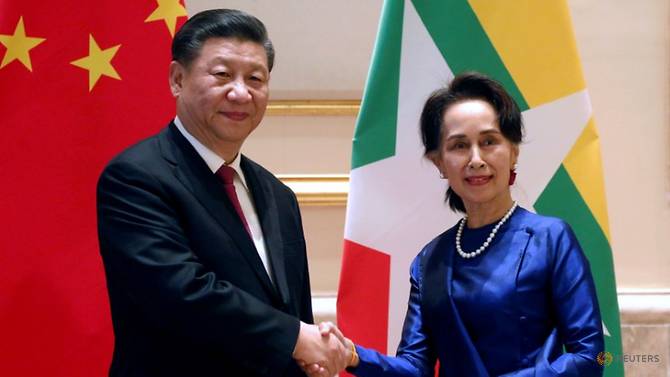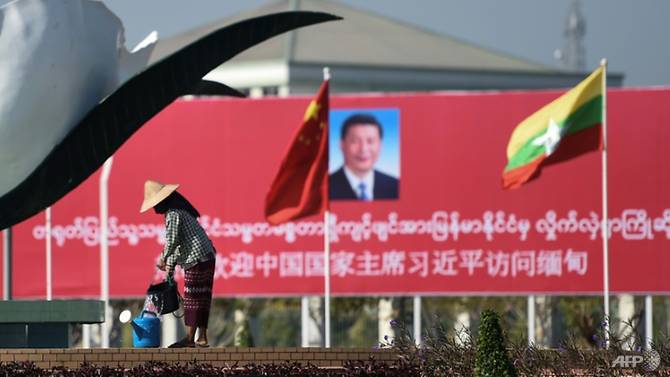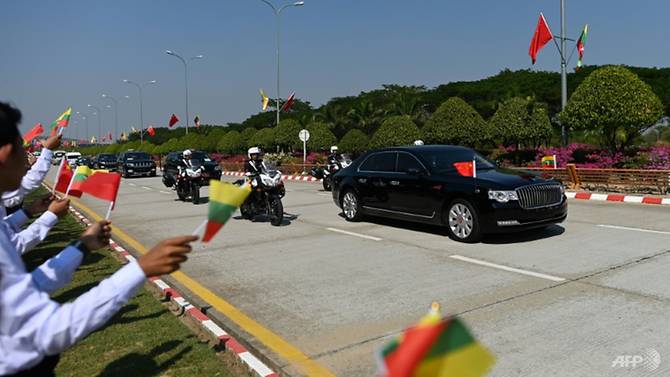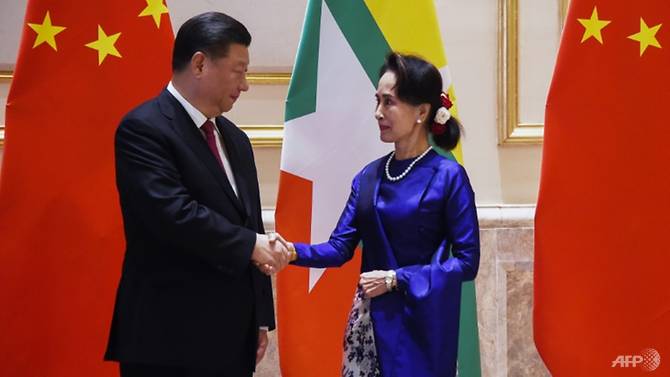
17 Jan 2020 Channel News Asia
NAYPYIDAW: Chinese President Xi Jinping vowed to usher in a “new era” of ties with Myanmar after a red carpet welcome Friday (Jan 17) on a state visit aimed at buttressing the embattled government of Aung San Suu Kyi and driving through multi-billion-dollar infrastructure deals.
Myanmar fighter jets escorted Xi’s plane as it touched down in Naypyidaw where children presented him with flowers, according to China’s official Xinhua news agency, as he was whisked off to a greeting party.In addition to being its largest investor, China has become an indispensable ally for Myanmar as it reels from Western isolation over the Rohingya crisis.
But widespread mistrust of Beijing’s ambitions and its influence over armed insurgencies in areas bordering the two countries threaten to undermine the bond.

Xi told Myanmar leaders he was “convinced that the concerted efforts of our two sides will make this visit a success and take the bilateral ties to a new level and into a new era,” Xinhua reported.
During the trip he is expected to sign a series of mammoth infrastructure deals as part of China’s Belt and Road Initiative – a global trade plan that promises to change the face of Myanmar.
The centrepiece of the so-called China-Myanmar Economic Corridor (CMEC) is a US$1.3 billion deep-sea port at Kyaukphyu in central Rakhine state, giving Beijing a gateway to the Indian Ocean.
A high-speed rail link is also on the cards to connect the port and nearby planned industrial zone with the countries’ shared border.
Bilateral trade was worth US$16.8 billion last year and Beijing holds the biggest share – around US$4 billion or 40 per cent – of Myanmar’s foreign debt.
Billions of cubic metres of gas and millions of barrels of oil from offshore rigs are pumped each year across the country into China.

“The next one, two, three decades will be defined by Myanmar’s relationship with China,” said Yangon-based analyst Richard Horsey.
Xi will sit down with Aung San Suu Kyi and army chief Min Aung Hlaing in separate meetings Saturday.
Ahead of the visit Aung San Suu Kyi made a rare appearance in Kachin state on the border with China.
Kachin is the site of a planned Chinese-backed US$3.6 billion, 6,000 megawatt dam that was mothballed in 2011 in the face of vociferous criticism across the country.
This is thought to have been a personal slight to Xi, who signed off on the Myitsone dam with Myanmar’s then-military junta as vice president in 2009.
PROTESTS PLANNED
Activists are expected to protest in the commercial hub Yangon on Saturday against any reinstatement of the project.
Economic interests aside, Myanmar’s relationship with the superpower has other benefits.

In an op-ed in Myanmar’s state-run media this week, Xi said China supports Myanmar in “safeguarding its legitimate rights and interests and national dignity”.
China shields Myanmar at the United Nations, where pressure is mounting for accountability over the treatment of Rohingya Muslims.
Aung San Suu Kyi personally defended her nation against accusations of genocide at the UN’s top court last month after a 2017 military crackdown forced 740,000 Rohingya over the border into Bangladesh.

The alleged atrocities took place in Rakhine, which has since descended into a civil war between the military and an ethnic Rakhine rebel group.
Myanmar has nonetheless declared the state open for business.
While many Western investors are steering clear, China – competing against other regional giants – has few such qualms.
“Xi’s visit will amplify concerns the West is losing Myanmar to China,” said Horsey.
Domestically, Aung San Suu Kyi needs economic wins as well as diplomatic support as she heads towards elections due at the end of this year.
Xi’s visit has triggered mixed reactions.

A number of key militant groups – known to be under the shadowy influence of Beijing – welcomed the summit.
But a plethora of activists spoke out against China’s projects and Amnesty International weighed in, decrying the “absolute lack of transparency”.
Rakhine locals, meanwhile, fear they will again be overlooked after previous Beijing-backed infrastructure projects left many without land or livelihoods.
“They didn’t bring any benefits for us, not even any jobs,” Moe Moe Aye from Kyaukphyu SEZ Watch Group told AFP.
Source: AFP/zl
